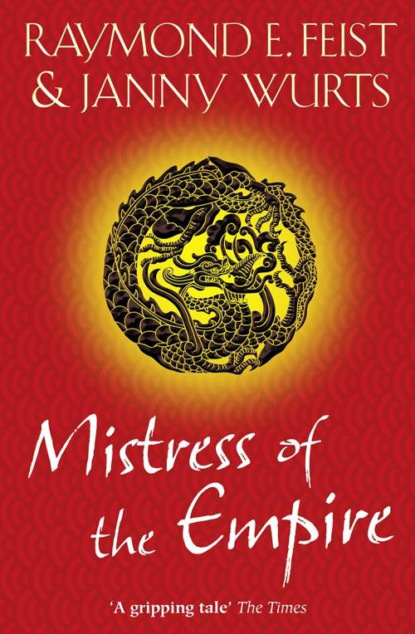По всем вопросам обращайтесь на: info@litportal.ru
(©) 2003-2025.
✖
Mistress of the Empire
Автор
Год написания книги
2018
Настройки чтения
Размер шрифта
Высота строк
Поля
‘Here’s to letting them be,’ Arakasi hooked back the flask and drank in an unusual fit of pique. The assignment Mara had set him was damned near impossible. Caravans traveled only as far as the gate to the river bridge. There, the crews surrendered their reins to servants from the inner city, and each load was vigorously searched before the goods rolled forward. The bridge did not go all the way across the lake, but ended in a water landing, where inbound supplies were offloaded into boats, and inspected a second time. Then polemen ferried them across, into the City of the Magicians.
This was the third man to relate the fate of intruders: no one infiltrated the City of Magicians, and any who tried were transported magically to a watery grave or else driven mad.
Confronted by a bleak conclusion, Arakasi sucked from the flask to fortify himself. Then he surrendered the remains of the liquor to the hairy caravan master, and slipped unobtrusively out to use the privy.
In the stinking dimness of the road hostel’s privy, Arakasi studied the coarse board walls where passing caravan teams had scribbled or scratched a motley assortment of initials, derisive comments on the quality of the hostel’s beer, the names of favored ladies of the Reed Life left behind in bordellos to the south. Among them was the mark he sought, done in white chalk: a simple stick figure, standing. By the drawing’s knees was what looked to be a stray line, as if the artist’s hand had skipped a beat, in his haste. But seeing this, Arakasi closed tired eyes and breathed a sigh of relief.
His agent, who happened to be a charcoal burner’s errand boy, had been by, and the news was good. The warehouse operation where he had nearly been netted by enemies had been out of the message network for two and half years and at long last the dyer across the street had promoted his eldest apprentice. The tradesman’s son who applied for the now vacant position would be an Acoma agent. At last Arakasi could begin to rebuild his network. The warehouse had been operating solely as a business since the disaster of his near capture. The proprietor had accepted his demotion from spy to business factor with stone-faced resignation. Both he and Arakasi were anxious to start laying off various staff members and stevedores, but this could not be done in too much haste; the men were valuable, some useful as agents in some better distant post, but not if the trade house was still under enemy scrutiny. And, judging by the smoothness of the net that had nearly caught him, Arakasi dared not assume otherwise. Slowly, painstakingly, he must come at the problem from another angle. An agent at the dyer who could observe who still watched the warehouse would tell him much.
Abruptly aware that he must not spend overlong in the privy, he performed the expected ablutions and departed through the creaky wooden door. It occured to him, on unpleasant intuition, that the vacancy in the dyer’s shop might not be so fortuitous, after all. If he were that clever enemy, might he not be trying to set his own agent into the position? What better way to keep watch on the warehouse, after all, since loiterers and beggars on corners were far more conspicuous as plants.
Chilled by cold certainty, for he believed his enemy to be as clever as himself, Arakasi cursed and spun around. Muttering as if he had forgotten something, he barged past the drover’s boy who crossed the yard toward the privy, and slammed back in through the door.
‘There it is, gods be praised,’ he muttered, as if misplacing important items in stinking public facilities were an everyday occurrence. With one hand he twisted a mother-of-pearl button off his cuff, and with the other he erased the head of the chalk figure and scratched an obscene mark beside it with his nail.
He hurried out and, confronted by the furious boy whose errand he had interrupted, shrugged. He flashed the button in apology. ‘Luck charm from my sweetheart. She’d kill me if I lost it.’
The drover’s boy grimaced in sympathy and rushed on toward the privy; he’d had more of the hostel’s beer than was healthy, by the look of him. Arakasi waited until the door banged fully closed before he slipped off into the wood by the roadside. With any luck, the charcoal burner’s lad would happen by within the week. He would see the altered chalk mark, and the obscenity that signaled for an abort on the placement of the agent as dyer’s apprentice. As Arakasi moved soundlessly through tree needles, under an unseasonally grey sky, he ruminated that it might indeed be more profitable to have the lad who finally took the apprenticeship watched; if he was innocent of any duplicity, no harm would result, and if he was a double agent, as Arakasi’s intuition told him, he might lead back to his master …
Later, Arakasi lay belly down in dripping bushes, shivering in the unaccustomed chill of northern latitudes. Light rain and a wind off the lake conspired to make him miserable. Yet he had spent hours here, on several different occasions. From this vantage point in the forest, on a jutting peninsula, he could observe both the bridge gate and the boat landing where servants loyal only to the magicians loaded inbound goods into skiffs and ferried them across to the city. He had long since concluded that a smuggled entry by way of the trade wagons was a doomed enterprise. The caravan master’s tale had only confirmed his suspicion that inbound goods were also surveyed by magical means for intruders. What he looked for now was a way to gain entrance to the city by stealth, avoiding the apparently all-seeing arch over the bridgeway.
The isle lay too far across the water to swim over to it. From where Arakasi hid, its buildings appeared blended together into a mass of pointed towers, one of which was tall enough to pierce into the clouds. Through the ship’s glass he had bought from a shop on the seacoast, he could make out steep-walled houses and looping, arched walkways that cut through the air between. The lakeshore was crammed with stone-fronted buildings, oddly shaped windows, and strange arched doorways. There were no walls and, as far as he could tell, no sentries. That did not rule out defenses of arcane means; but plainly the only way an intruder might enter the city was a night crossing by boat, and then the scaling of some garden wall, or seeking some cranny to gain access.
Arakasi sighed. The job was a thief’s work, and he needed a boat in a place where there were neither habitations nor fishing settlements. That meant smuggling one in on board a wagon, no easy task where inbound caravans were comprised of men who all knew one another intimately. Also, he would require a man trained in stealth, and such were not found in honest trades. Neither problem promised a fast or an easy solution. Mara would have a long wait for information that might, in all honesty, be impossible to acquire.
Ever a practical man, Arakasi arose from his damp hollow and turned into the forest. He rubbed a crick in his neck, shook moisture from his clothing, and made his way back toward the road hostel. As he walked, he pondered deeply, a habit that more times than not had given rise to accurate intuition. He did not press the issue that immediately frustrated him, but pursued instead another problem, one that had not seemed significant at first, but was becoming an increasing aggravation.
Try as he might, he could not seem to get a start at placing new agents in the Anasati household. Only one operative remained active, and that one was elderly, an old confidant of Jiro’s father’s that the young Lord had taken a dislike to. The servant had been relegated to a position of little importance, and what news he heard was only slightly more informative than street gossip. For the first time, Arakasi wondered whether his failed attempts to replace that agent might be significant beyond coincidence.
They had appeared innocuous, certainly, each of seven tries foiled by what had seemed ill luck or poor timing: Jiro in a temper, a factor in too belligerent a mood to grant an old friend favors; and most lately, an illness of the stomach that prevented a trusted servant from making a recommendation for recruiting a newcomer.
Arakasi stopped dead, unmindful of the rain, which had begun to fall much harder. He did not feel the cold and the wet that slid in droplets down his collar, but shivered instead from inspiration.
He had been a fool, not to suspect sooner. But chance may not have been behind such a string of seemingly unrelated misfortunes. What if, all along, his attempts to infiltrate the Anasati household had been blocked by a mind more clever than his own?
Chilled to the bone, Arakasi started forward. He had long admired the enemy’s First Adviser, Chumaka, whose flair for politics had benefited the Anasati since Jiro’s father’s time. Now Arakasi wondered whether it was Chumaka’s cleverness he fenced with, as unseen antagonist.
The thought continued, inexorably: was it possible that an Anasati presence was behind the byplay at the silk warehouse? The elegance of this possibility appealed to Mara’s Spy Master. One gifted enemy made more sense than two unrelated foes with equal brilliance.
Deeply disturbed, Arakasi hurried his step. He needed to get himself warm and dry, and to find a comfortable corner where he could think undisturbed. For each balked effort showed that he faced a rival equal to his best efforts. It was distressing to consider that a connection might exist between such a man and Mara’s gravest enemy, even more by the possibility that this rival might excede his talents.
Getting a spy into the City of the Magicians was an impossible enterprise and its importance paled to insignificance before the threat posed to Mara’s spy network by Jiro’s adviser. For Arakasi had no illusions. His grasp of the Game of the Council was shrewd and to the point. More than a feud between two powerful families was at play here. Mara was a prominent figure in the Emperor’s court, and her fall could touch off civil war.
• Chapter Six • Gambits (#ulink_af2ad2c8-57aa-5798-8606-d6f356200acf)
Chumaka frowned.
With increasing irritation, he scanned the reports stuffed between the sheafs of notes he had prepared for his master’s forthcoming court session. The news was none of it good. He raised a hand and chewed a fingernail, frustration making him savage. He had been so close to tracing the Spy Master behind the original Tuscai network! It had been predictable that the net in Ontoset would be shut down as a result of the bungling chase at the silk warehouse. But what made no sense at all was that after a passage of time approaching three years, the seemingly unrelated branch in Jamar should still be kept dormant as well.
Those ruling houses who undertook the trouble and expense of spy nets tended to become addicted to them. It was simply inconceivable that any Lord grown accustomed to staying informed by covert means should suddenly, for the discovery of one courier, give up his hard-earned advantage. Lady Mara most of all; she was bold or cautious as circumstance dictated, but never one to be unreasonably fearful. The death of her son could not have changed her basic nature so radically. She could be depended upon to use every means at her disposal, and never be deterred by one minor setback. Chumaka flinched slightly as tender flesh tore under the worrying gnaw of his teeth. He blotted the bleeding hangnail on his robe and shuffled his papers into order in disturbed preoccupation. The situation bothered him. Each day Jiro was closer to demanding his answers outright. The First Adviser to House Anasati was loath to admit he was growing desperate. He had no choice but to consider the unthinkable: that this time he might have run up against an opponent who outmatched him.
The idea rankled, that any mind in the Empire could outmaneuver Chumaka.
Yet such a possibility could not be dismissed. In his gut he knew that the network was not disbanded, merely dormant or turned toward an unexpected quarter. But where? And why? Not knowing was costing Chumaka sleepless nights. Black circles and pouches under his eyes gave his already angular visage a careworn look.
The scrape of oiled wood roused Chumaka from distressed reverie. Already servants were pulling aside the screens in the grand hall in preparation for Jiro’s public court. Omelo had the Lord’s honor guard in place beside the dais, and the hadonra was overseeing disposition of his factors and secretaries. Within minutes, those allies or houses seeking court with the Lord of the Anasati would be arriving, escorted to their places in order of rank. Lord Jiro would enter last, to hear petitioners, exchange social chat, and, sometimes, negotiate new business.
Chumaka snapped the papers in his hand into a roll and stuffed them into his satchel. Muttering, he stalked to the dais to be sure his preferred cushions were arranged to his satisfaction. The list of Jiro’s guests was a long one, and this court could last into the evening. A skinny man with lanky bones, Chumaka liked plenty of padding under his rump through extended sessions. Physical aches he regarded as a distraction to his thinking, and with this rival Spy Master so far adept at eluding him, he could not afford to miss any nuance of what transpired.
The grand hall slowly filled. Servants hurried in and out bringing refreshments and directing the placement of fan slaves. The day outside was hot, and Jiro’s subtle habit was to be sure his guests were cool and comfortable. He catered to them to extend their patience, and they, believing he spoiled them to win their favor, felt their egos stroked enough that they often granted him concessions more magnanimous than they had intended at the outset.
Lord Jiro entered with little fanfare. His scribe called out his name, and only two warriors marched on either side, a half step behind their master. Today his clothes were simply cut, though sewn of the finest silk. He chose carriage and clothing that were rich but not ostentatious, and that could be interpreted as firm and manly, or boyishly innocent, depending on the advantage he wished to press. Chumaka regarded the ambivalent effect and stroked his chin, thinking: were Jiro not chosen by the gods to wear the Anasati mantle, he might have made a superb field agent.
Then such frivolous speculation was cut short as the young master ascended the dais. His warriors flanked him as he took his place on his cushions and made formal pronouncement. ‘The court begins.’
Then, as his steward moved among the guests to announce the first on the roster, Jiro leaned over to confer in quiet tones with Chumaka. ‘What need I pay close attention to, this day, my First Adviser?’
Chumaka tapped his chin with a knuckle. ‘To endeavor to compromise the Xacatecas’ support of Lady Mara, we’ll need allies. More to the point, we’ll need their wealth. Consider the offer of the Lord of the Matawa to ship our grains to the South in exchange for certain concessions.’ He pulled the appropriate note from the many sheaves that jammed his satchel and swiftly scanned the lines. ‘The Lord wishes a favorable match for his daughter. Perhaps that bastard nephew of your cousin’s might suffice? He’s young, but not ill-favored. Marriage into a noble house would redirect his ambition and, down the line, provide us with another ally.’ Chumaka lowered his voice as others began to approach the dais. ‘Rumor has it that this Lord Matawa is trading with Midkemians from the city of LaMut.’
Jiro heard this with a look askance. ‘Rumor? Or the gleanings of one of your listeners?’
Chumaka cleared his throat, keeping this point deliberately ambiguous. ‘I remind my Lord that many of those involved in LaMutian merchant consortiums were born in Tsuranuanni, and they may provide us with the same advantage the Acoma enjoy in their exclusive trading concessions.’ He finished in a thick whisper, ‘Mara anticipated well when she got her dispensation from the Keeper of the Imperial Seal. She acted on an outside guess and tied up the obvious goods coming through the rift from Midkemia. But because she moved on the generalities of a wild hunch, she didn’t anticipate everything. There are a half-dozen items we can import that would make us rich, and while Mara might successfully block Anasati attempts to traffic goods from Midkemia, there’s little she can do to prevent the LaMutians from selling across the rift to the Lord of the Matawa.’
Jiro smiled. ‘How badly does Lord Matawa wish an exclusive shipping license? And how ugly is his daughter?’
Chumaka smiled broadly. ‘His daughter takes after a mother who looks like a dog, a particularly ill-aspected dog, in fact. There are two younger sisters also. Both of these have crooked teeth, and only the eldest can be given away with the title. Their father needs a bigger treasury if his youngest children are to escape the fate of becoming the consorts of low-born merchants. That means the Lord of the Matawa desires this trading concession very badly indeed.’
As a delegate from the most minor house approached the dais and gave his bow of respect, Jiro concluded his conference with Chumaka. ‘Your counsel seems sound. I will proceed to make the Lord of the Matawa a happy man.’
He faced politely forward to hear his first petitioner, when a disturbance at the rear of the hall turned half the heads in the room. A florid man in a purple robe had thrust his way past the door servants. These were slaves, and in fear of their master’s displeasure, they cast themselves face down in obeisance at their lapse. The man who had intruded paid no heed but rushed headlong into the hall, ignoring the astonished protest of the Anasati house servants in relentless pursuit on his heels. He swept past the seated rows of Jiro’s guests, with no more heed of them than if he had been alone in the great hall. Striding directly down the long approach to the dais, and causing the war banners to swing in the rafters in a wake of disturbed air, he skidded to a stop before Jiro. Too agitated for manners or ceremony, he shouted, ‘Do you have any idea of what she has done!’
The delegate he had displaced looked ruffled; Jiro himself was discommoded, but he covered this with a swift glance at Chumaka, who murmured the appropriate name behind his hand in a tone only his master could hear.
To control this startling confrontation, Lord Jiro said in his chilliest tone, ‘Welcome, Lord Dawan. You seem … discommoded.’
The thick necked man thrust his head forward, looking like a needra bull attempting to shove through a fence to reach a cow in full season. Nearly spitting with anger, he waved both hands in the air. ‘Discommoded? My Lord, I am ruined!’
Aware of muttering in the hall, as Lords and delegates were made to wait through this blatant breach of good manners, Jiro raised a placating voice. ‘Lord Dawan, please, be seated lest your distress cause you to be overcome by the heat.’ At a signal from their Lord, Anasati servants rushed forward to bring the distraught man cold refreshment.
Disdaining to appear to show favoritism, Lord Jiro spoke quickly, aware he must bridle the other petitioners’ resentment, and to quickly assess whether he could gain impromptu advantage from the interruption. Dawan of the Tuscobar was an occasional business associate and an unsure ally. Jiro’s inability to win him clearly to his cause had been an irritation, but the inconvenience was minor. The far-reaching ramifications of this byplay were anything but small. House Tuscobar held influence with the Lord of the Keda, whose support in any confrontation with Mara would net the Anasati a solid advantage. Jiro judged the alliance would be critical in the future, when the traditionalist plot to reinstate the High Council finally met with success.
Above the disgruntled murmurs of his petitioners, Lord Jiro called, ‘Let all who seek aid of the Anasati take heed. My house listens with sympathy to the difficulties of established friends. My Lord of the Tuscobar, what has happened?’
The heavyset Lord took a swallow from the glass of cold juice he had been handed by Jiro’s staff. He gulped in an effort to compose himself. ‘My entire fleet, carrying every last grain of my year’s harvest, was sunk!’
Jiro’s eyes widened in astonishment. ‘Sunk? But how?’
‘Some malignant spell spun by that witch,’ Dawan answered.











